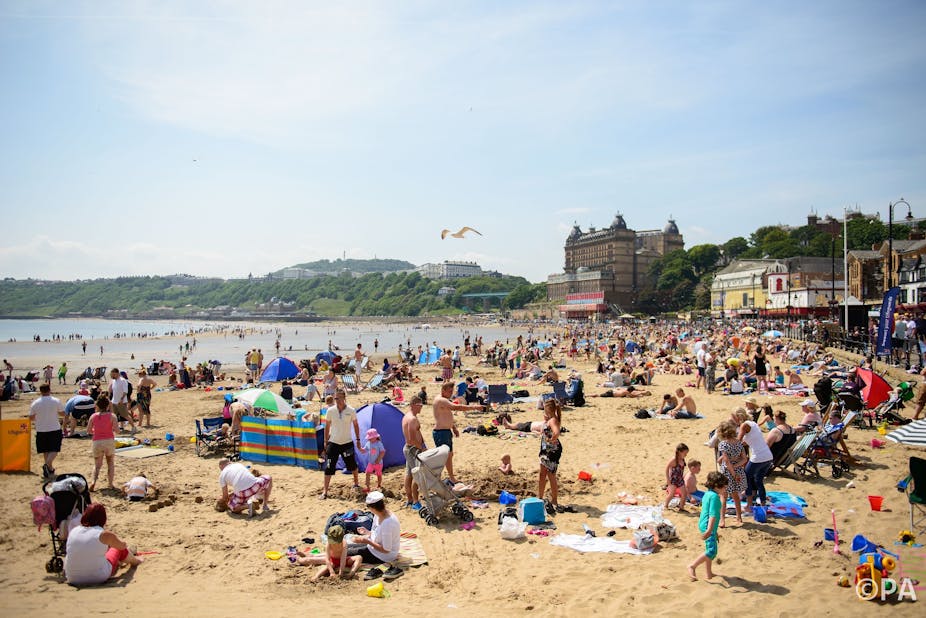Bognor or Borneo? Penzance or Paris? Scarborough or Sao Paulo? The decision of whether to spend your annual leave holidaying in a foreign clime, at a campsite in the UK, or even just in your back garden, can cause anxious analysis of the bank balance.
New figures released by the Office of National Statistics show that in 2012-13 there was a 4% increase in the number of UK residents holidaying abroad, alongside a 1.3% decrease in visits to UK destinations. Does this signal the end of the phenomenon of the “staycation”?
For those in the tourism business, a staycation refers to domestic holidaymaking in all its forms, rather than just taking time off work but choosing to stay at home.
The pick-up in foreign holidays is a marked turnaround from the worst of the economic downturn in 2008-9 when there was a 16% decline in overseas holidays and a 17% increase in the number of holiday trips taken in the UK.

But it should perhaps be of no surprise that as the UK economy begins to recover, adventurous Brits still prefer to escape the uncertainty of the summer weather. The effects of the Eurozone crisis has also helped make holidaying to southern European countries such as Spain, Greece, Italy and Portugal competitively priced.
Perennially popular overseas destinations such as the US, France and Cyprus have also remained buoyant markets for UK holidaymakers, according to the ABTA Travel Trends Report 2014. Cheaper countries outside the Eurozone such as Turkey and Tunisia are still popular – although Egypt suffered a severe drop due to political unrest. Long-haul destinations such as Mexico, Burma, Vietnam, India and Thailand also represent great value for money for UK travellers in an era of a strong pound.
Decline in short trips
UK domestic tourism has enjoyed a renaissance over the past five years, largely driven by consumers’ strong-felt need to ring-fence leisure activities and time off in spite of the impact of the recession on their perceived quality of life. Many consumers remain concerned about debt and their future financial security, signalling a profound and longer-lasting change in behaviour.
But there are a number of indicators which point to the fact that all is not over for the staycation.
First, the ONS data refers to all types of holiday trips abroad of at least one night, so it does not distinguish short breaks from longer (main) holidays. British consumers developed a pre-recessionary habit of taking numerous short breaks to supplement main holidays, some of which were to European city destinations such as Barcelona, Prague or Venice.
It is these types of short trips which have been replaced by short breaks to UK destinations. The recession has also led to an overall decrease in the average length of holidays.
According to the Great Britain Tourism Survey (GBTS), short break trips of 1-3 nights have driven the growth in domestic tourism, which rose 18% between 2006 and 2012.
Although there has been an increase of 8% in breaks of between four and seven nights over the same period, this is from a much lower base and represents an increase of around 1m, compared with almost 5m increase in short breaks. It is this four nights and over category which is steadily declining. The number of trips of more than eight nights has not increased or decreased, which probably represents a core market of long-term domestic holiday makers.

Better off at home
Short overseas breaks, driven by the rise of budget airlines, have been blighted by a number of issues that are unrelated to the direct impacts of the recession on household budgets. These include the perception that these holidays are of low-quality, come with hidden costs, and cause increased travel discomfort due to flight overcrowding and air travel security measures. In contrast, domestic holiday breaks have enjoyed many positive associations.
Visit England have been conducting surveys on the staycation market throughout the recession. Their research has highlighted that consumers perceive the UK to deliver great value relative to popular European destinations (1 Euro is perceived to be equivalent to £1).

England is able to offer competitively priced breaks, where the role of discounts plays an important factor in consumer’s decision-making. Holidays in England are perceived to be “easy”, in the context of busy and stressed lives.
Nostalgia and thrift
In addition, England is seen as being able to provide exciting and authentic experiences. Some consumers have found holidaying in England to be nostalgic, allowing them to take their children to places that they visited as children. Younger consumers have found England pleasantly surprising, able to deliver new experiences they didn’t expect.

But the biggest indicator that the staycation might be here to stay is in the way that the recession has impacted on consumer’s perceptions of value and thrift. Euromonitor an annual list of top consumer trends has highlighted thrift as a way of life for 2014 that extends beyond the immediate economic impacts of the downturn. This is combined with an increased interest in ethics, social responsibility, wellbeing and work-life balance.
All these facets indicate that short breaks in domestic destinations will retain their interest for UK consumers as long as the tourism industry can continue to develop innovative and competitive travel experiences within Britain.

